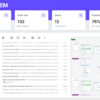The AI landscape may feel like uncharted territory, but we’ve seen this kind of disruption before. Each wave of transformative technology follows a familiar pattern: initial hype, resistance from incumbents, and eventual dominance by those who adapt early and decisively.
Here are three historical shifts that provide important lessons for how to approach AI today:
1. Steam Power: Raw Power Scales Work
Then: The steam engine reshaped the economics of labor. Productivity surged. Handcrafted production gave way to industrial systems that scaled efficiently. Resistance was loud, but the shift was inevitable.
Now: AI is reshaping knowledge work in the same way. Tasks that once relied on expert intuition and manual effort are now handled by models that operate at scale and near-zero marginal cost.
Future: Companies that build structured, systematized AI-driven operations will outperform those who continue to rely on informal processes and tacit knowledge. This is about scaling insight, not just output.
2. Electrification: Infrastructure Is Only Half the Battle
Then: Replacing steam engines with electric motors didn’t deliver results until factory floors and workflows were redesigned around the new power source.
Now: Adding AI to broken or outdated processes rarely delivers real value. The benefits show up when businesses re-architect their operations around intelligent automation, data flow, and real-time decision-making.
Future: AI will become a quiet utility, measured not by adoption rate but by operational effectiveness. Just like electricity, its impact is felt in what it enables, not in how visibly it’s used.
3. Assembly Line: Efficiency Over Individual Brilliance
Then: Ford’s assembly line made high-efficiency production the standard. What was once the domain of skilled artisans became a modular, repeatable system.
Now: Generative AI and automation platforms are modularizing creative and analytical tasks. From drafting content to generating financial models, what used to take hours is now a matter of minutes.
Future: The advantage will belong to organizations that orchestrate these modules into well-designed, outcome-focused systems. Orchestration, not individual brilliance, will define the next wave of high-performance businesses.
Strategic Implications
- Rethink your processes from the ground up. AI needs structured environments to thrive.
- Focus on system design. The value is in how tasks connect and compound.
- Treat data as infrastructure. Proprietary knowledge is a long-term asset.
These are not just historical echoes, they are signals. AI is not a trend to experiment with; it’s a shift in how business operates at a fundamental level.
The organizations that recognize these patterns early will build more than efficient systems. They’ll build durable competitive advantage.
Interested in exploring how these principles apply to your business? Book a strategy call.

















